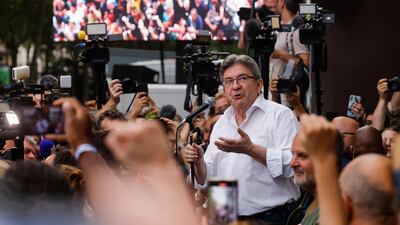After the seismic electoral event that removed legislative authority from French President Emmanuel Macron, far-right leader Marine Le Pen had every right to appear before adoring supporters beaming with jubilation and pride.
Her National Rally movement (RN) dramatically increased its share of parliamentary seats from eight to 89.
It was an achievement greater than even she had expected. And it effectively dismantled the “republican front” in which voters of opposing political persuasions have traditionally buried differences to deny power to her party.
The RN’s record score also completed a remarkable image makeover.
Co-formed as the Front National by her father, Jean-Marie Le Pen, its historic association is with racism, Islamophobia, anti-Semitism and more than a hint of sympathy for French wartime collaborationists and those who violently resisted Algerian independence.
The left-wing and Green alliance Nupes, led by the veteran far-left polemicist Jean-Luc Melenchon, made significant advances of its own in Sunday’s decisive second round of voting.
Nupes becomes the biggest opposition force in the National Assembly with 133 seats, almost doubling the combined strength of its component parts.

With more than half the electorate abstaining, the results left Mr Macron – re-elected as president in April – and allies with just 245 of the Assembly’s 577 seats, 44 short of an absolutely majority.
It reduces his movement, La Republique En March (the republic on the move), to a state of political paralysis. While the constitution permits limited lawmaking without a vote, he must otherwise seek pacts with others, notably the conventional right and centre-right Les Republicains, also in disarray and split on whether to co-operate.
Mr Macron had urged voters renew their faith in his centrist government and reject extremes of left and right. But this, along with lacklustre campaigning, amounted to a major miscalculation of the public mood.
In a country where the “extremist” label is routinely attached to Ms Le Pen and Mr Melenchon, extremism has arguably emerged as the new normal. The combined vote for the RN and Nupes was more than two million higher than for the Macronist alliance Ensemble.
Both radical leaders have charisma. Their populist policies, with oddly similar promises to block later retirement and offer generous help to working-class voters struggling with rocketing prices, overcame any suspicion. Centrists warned that big-spending, protectionist policies were economically incoherent; plenty of voters clearly felt they could hardly be worse off than under Mr Macron’s government.
Ms Le Pen owes part of her electoral flourish to an energetic drive to detoxify her movement’s reputation, making large sections of the public forgive or forget its sinister past. The presence of Eric Zemmour, even more far-right, in both presidential and legislative elections, gave her the rare bonus of high moral ground.
When Mr Macron won his second term at the Elysee Palace on April 24, with 58.5 per cent of the vote in the run-off against Ms Le Pen, it was a result that flattered to deceive.
On a personal level, the legislative elections have exposed a disturbing level of public disenchantment. If many in France unquestionably admire him, others see only a cold, arrogant elitist out of touch with day-to-day concerns.
He largely impresses on the international stage, his carrot-and-stick mixture of diplomacy, tough words and sanctions after Russia’s invasion of Ukraine striking a chord with many in France.
But the statesmanlike qualities proved insufficient to protect him from the ravages of inflation, distrust of his policies on crime and immigration and a feeling that he talks down to ordinary people.
“Too proud for his own good,” said one moderate voter, from la Sarthe in western France, in response to Sunday’s election results.
Mr Melenchon and Ms Le Pen were more scathing.
“The rout of the presidential party is complete,” said Mr Melenchon, who opted not to defend his own seat but hoped for even stronger results that would have installed him as a hostile prime minister, pitting parliament against the Elysee.

“The people have spoken,” said Ms Le Pen, hailing the end of the “Macron adventure” and the relegation of his government to minority status. She is stepping down from the RN presidency to concentrate on leading her parliamentary troops, now easily numerous enough to qualify as an official, publicly funded group.
What this means for Mr Macron’s movement that brought together elements of left, centre and right to transform the French political landscape ahead of his emphatic election as president in 2017, is less clear.
“The situation is unprecedented,” Prime Minister Elisabeth Borne conceded. “The National Assembly has never experienced such a configuration under the Fifth Republic. As a central force in the Assembly, we must assume a particular responsibility. We will work [immediately] to build a majority of action."
One useful example of such action might be an effort to encourage more people to use the new title of Mr Macron’s party, Renaissance. Given the scale of reconstruction needed after a chastening political rebuff, it seems more appropriate than "the republic on the move".















